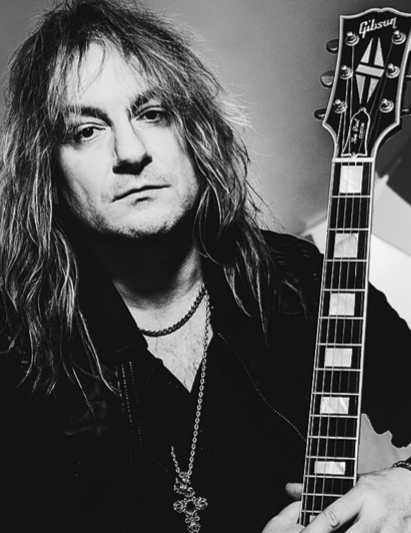Gotthard guitarist and co-founder, Leo Leoni, is all about performance, giving the fans what they want, and living for the music, no matter what the world might throw at him. We caught up with him in December, before the final shows of Gotthard's tour.
So, you’ve had 11 number ones in a row, Leo. Kind of speaks for itself, really, doesn’t it?
[smiles] Yeah, it’s not bad, I guess. Could have been worse! We have always tried to make great records, and when we’re not doing that, we’re touring. It’s been a case of one year making a record, and one year production.
And you’re about to complete your BANG tour, right?
Yeah, the last show is on Saturday, in San Moritz. We think it’s going to be a pretty hot show, in a very cold place! We’re looking at temperatures of -12 to -15 Celsius, but we’re lucky enough to have tube amps, so we can always use those to keep our hands warm if we need to!
You guys had to pick yourselves up back in 2010 after the tragic loss of your talented singer and co-founder, Steve Lee. How do you recover from something like that?
It’s not easy, but we have to always remember that we are blessed to do something that we believe in, and it was our dream as kids. Steve and I lived that dream, and were so lucky to do what we loved as our profession, and somehow tour it around the world. Life is not nice sometimes, but you have to pick up and keep going. What happened with Steve was shocking; we had reached that dream, and it was important to continue his legacy, and never give up. It happens. Life is hard. And thankfully, we found Nic Maeder, and he suited what we were looking for. We had to go on. Luckily enough, we have a loyal fanbase, and it’s a great thing for us and the fans to see a band keep going when the going gets as tough as it did. It’s a good lesson in life: whatever stands in your way, try and make it happen. Or as one famous songwriter once said, ‘take a sad song and make it better. [smiles] I’m sure you know who that was.
Indeed. Credit to you for pushing through the barricades, so to speak. Could we talk a little about the recording process, and the new kit you’ve adopted before I let you go to this gig?
[laughs] Sure. I think what we noticed when working with the likes of [producer/mix engineer] Charlie Bauerfeind is that the quality of kit is getting closer to whatever analogue was. He introduced me to Merging Technologies, which is basically a company which delivers through its products very high-res protocol. Now, when you have this kind of resolution, it is a true eye-opener. Back in the day, we’d use analogue Studer tape, and we’d be like, ‘let’s sketch the moment and if we’re lucky, we’ll get the best take ever’. Now, Charlie has set me up with Merging’s Horus, which is giving me the most pristine, beautiful sound; and for me, it’s what everyone is looking for. As a musician, you constantly experiment – with me, it’s guitar, as I’m a guitarist – and the way I’ve got Horus set up means whenever I pick that guitar up and press record, it’s going to catch the best possible take, with the best possible quality. When I heard the results for the first time, I was like, ‘oh wow, this is far ahead of anyone else’s technology today’.
We found that out on playback when we listened to the last two productions we recorded and mixed with Charlie and Claudio [Kernen, recordist]. And now, we are going to use this new technology to help us take an old school approach, back to our roots, and go and nail the best possible performances in one or two takes, without using and abusing it. We come from the old school where performance and the vibe of the song is everything; and in the end, the most important thing is the song and the melody. It’s always been our trademark, and it’s what people always remember.
